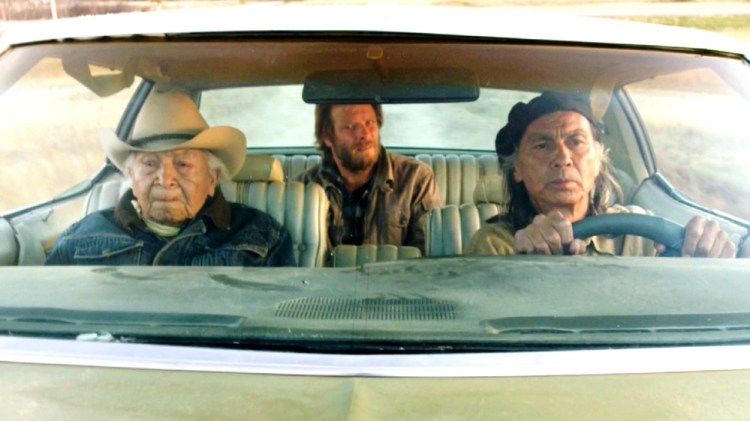Director Steven Lewis Simpson, Scottish native, I’m told, brings to the screen “Neither Wolf Nor Dog, as part of his 13-year quest to plum the history of the Oglala Lakota.
His sincerity is unquestioned, but his work here is unimpressive, and seems to consist of little more than keeping the cast warm and awake.
The script is by Kent Nerburn, and adapted from his book.
Nerburn, who should be taken seriously, is a well-known American author. He has published 16 books of creative non-fiction, and essays, focusing on Native American and American culture and general spirituality.
His story and impressive scholarly background make it difficult to understand why this film touches so lightly and with zero excitement.
Christopher Sweeney is the actor at the center of this docudrama played out on the Pine Ridge Reservation in South Dakota. Sweeney, clearly a talented actor with a future, plays author Nerburn with dignity and grit. Sadly, it’s not enough.
It should be noted here, that like Chief Dan, a WWII veteran, Sweeney is a Marine veteran of the first Gulf war where he received a Silver Star for gallantry in action.
We meet Neburn (Sweeney) in Minnesota, as he’s sending his family off to visit relatives, and then, after browsing through his mail and finding a handwritten letter from a stranger, he packs up his father’s old war bag along with writing material, and sets off on a thousand-mile pilgrimage to answer the plight of a survivor, Chief Dan, played 97-year-old Dave Bald Eagle.
Dave, who in real life landed on Omaha Beach on D-Day and having survived that, has spent the rest of his life on a dismal reservation with bits and pieces of family who, in this film, share his bleak existence.
Chief Dan, a Native American with little education, was somehow given a copy of Kent’s book, written in 1994, but felt it lacked the imprint of truth and firsthand experience.
So he put a couple of three-cent stamps on a letter asking Kent to come to the reservation and learn and convey the true story of the indigenous American’s trail of tears.
Arriving on the bleak windswept reservation, without a Starbucks or cellphone tower insight, Kent meets Dan’s companion Grover (Richard Ray Whitman) a tall, growly and embittered man who may or may not have served time in one of the branches of service.
Grover, not a bad actor with 13 or more films, all dealing with similar themes on his record, has nothing here that’s good to say of the “white man.” Grover appears to be permanently unemployed, but has assumed a spiritual responsibility for Chief Dan, and so tags alone with Kent and Dan, driving them through two days of vast prairie wasteland, in his trusted old car with gas supplied by the traveling author.
For most of the movie, much of which is spent in the old car, Chief Dan, a dignified man who died shortly after the film’s completion, mumbles a few lines, but mostly sleeps while a scratchy, contentious dialogue between Kent and Grover drags on as they take us through miles of open prairie.
What Kent hopes to find, especially when he’s written so many books on the subject, is a mystery.
“Wolf” is billed as a “road” film, but regrettably, the road is a barren one full of pot holes, and goes nowhere. It’s a nice try, but no cigar.
Director Simpson also ran the camera and edited the film.
To really know more about the Native American dilemma, I recommend reading Kent Michael Nerburn’s many books and seeing these three films:
“Cheyenne Autumn” 1964 “Bury My Heart at Wounded Knee,” 2007 and “The Cherokee Word for Water” 2013.
J.P. Devine, of Waterville, is a former film and stage actor.
Send questions/comments to the editors.




Success. Please wait for the page to reload. If the page does not reload within 5 seconds, please refresh the page.
Enter your email and password to access comments.
Hi, to comment on stories you must . This profile is in addition to your subscription and website login.
Already have a commenting profile? .
Invalid username/password.
Please check your email to confirm and complete your registration.
Only subscribers are eligible to post comments. Please subscribe or login first for digital access. Here’s why.
Use the form below to reset your password. When you've submitted your account email, we will send an email with a reset code.